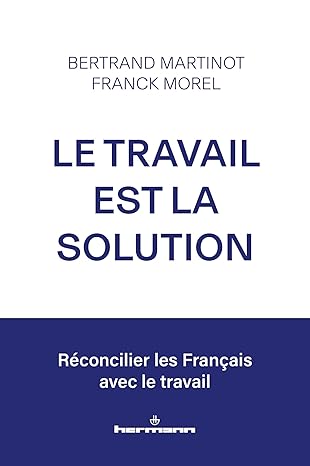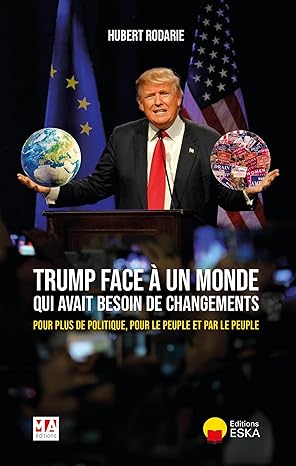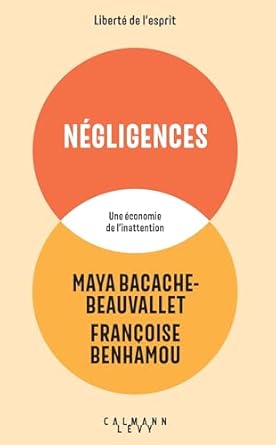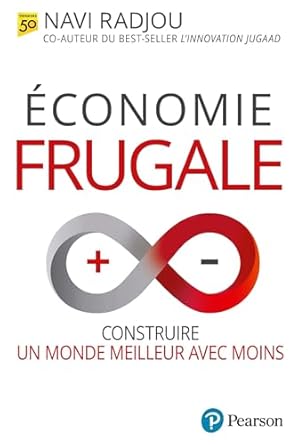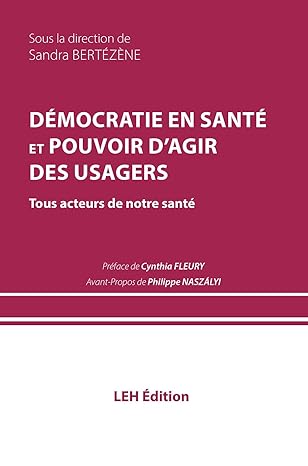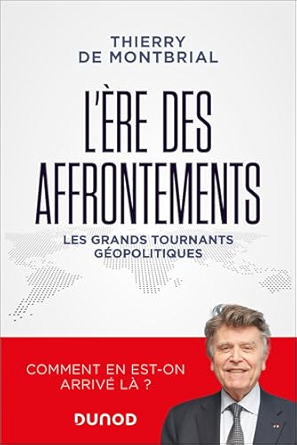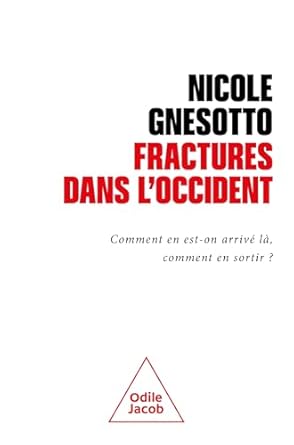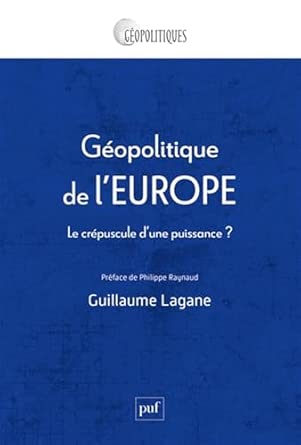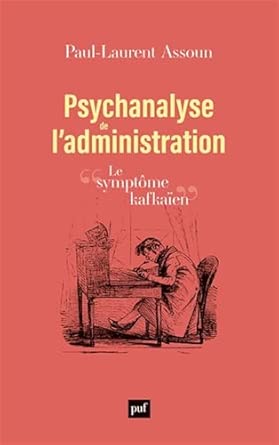The book begins with the observation of a profound crisis in the perception of work by our contemporaries. In the past, work was considered part of the human condition, earning a living by the sweat of one’s brow. It was then experienced as everyone’s participation in a collective progress that could benefit everyone. Today, the worker feels tossed about in the midst of non-negotiable considerations and changes, suffered rather than chosen. The social and moral context marked by the weakening of all collective benchmarks and the predominance of self-referential individualism only aggravates the malaise generated by deindustrialisation for nearly 30 years, and now the prospect of an AI that will apparently further reduce the need for human work. The authors then set out to show that the end of work is a chimera (as much a chimera as the end of history that was announced thirty years ago). They describe how and why, despite the desire to “restore the value of work” and other slogans, collective, political, fiscal and social choices have had the effect of discrediting work, hindering it and taxing it without helping companies to share a unifying quest for meaning with their employees. All in all, a book written by practitioners, Bertrand Martinot is a specialist in the issue of unemployment, employment policies and social dialogue. He received the 2014 Turgot Prize for a previous book Chômage: inverser la courbe (Unemployment: reversing the curve). He was social adviser to the Presidency of the Republic from 2007 to 2008, general delegate for employment and vocational training (DGEFP) from 2008 to 2012, then deputy director general of the Ile-de-France region in charge of economic development, employment and training until 2019. Franck Morel is a labour law lawyer. Advisor to Prime Minister Edouard Philippe and four labour ministers (Xavier Bertrand, Brice Hortefeux, Xavier Darcos and Eric Woerth). Both authors are associate experts at the Montaigne Institute. Hubert Rodarie
Hubert RODARIE, Trump faces a world that needed change… For more politics, for the people and by the people, Editions Eska,249 pages.
This new publication by President Hubert RODARIE, an author who has been recognized and crowned many times, confirms his ability to challenge his readers (who willingly lend themselves to it) by inviting them to leave their comfort zone for an original reading of the major trends and other ruptures in the world. To look beyond the foam of the waves, to understand the underlying undertones that are at work in the upheavals of the planet. … One year after his return, President TRUMP is raising many questions by trying to brutally reshape international relations according to his vision of the new world, accompanying his diatribes with threats, potential recourse to force, establishing punitive customs duties and the unpredictability of his reversals of alliances. Also, many see in this character nothing more than a revolutionary troublemaker undermining the consensus and the post-war world order, arousing contempt with his vulgarity and his extraordinary vanity: “.. strong with the weak and weak (deflated for some!!..) with the strong..”. Without fear of going against the tide, the author uses his expertise as a senior leader, backed by the scientific rigor of the engineer (which is also his trademark), with an impressive and documented knowledge of the History of the United States, to “try to understand the present and future motivations not only of the United States, but, symmetrically, of the European leaders and strategy.” In the first part, the author uses a historical analogy by examining the parallels to the political and social plans between the Athens of the 5th century BC, that of Pericles and the “Golden Age”, and the United States of the 21st century. There are many similarities between Trump and Pericles: they both rely directly on the people, consider their strategies of alliances and empires in the same approach, are supported by powerful real wealth (money, oil), with the same ability to mobilise the popular electorate beyond the “deep state” … “Them against us …” and finally a certain caution vis-à-vis wars to consolidate the support of the people. However, if the success of this first year of TRUMP’s return is quite flamboyant, as evidenced by the Wall Street party, the wait-and-see attitude is flagrant on the side of companies, and the American threat continues to weigh on the future of world GDP, without forgetting the end of the story for Athens, with the reminder of the “Thucydite trap”. However, “This framework makes it possible to understand the structuring dynamics of the United States as well as the logic underlying the actions of the Trump Administration.” The second part highlights: “the key issues, in particular the relations between the elites and the people, as well as the role of politics in the economic system and vis-à-vis the Central Banks in the US and in EUROPE.” In this context, the author develops his very well-argued vision (and produced in his previous works) of the independence and sovereignty of the Central Banks, or of the “symbol of inaction: Debt”, and the discrepancy between speeches and situations. Faced with the change in cooperation between China and the United States, the author’s conviction remains that “Europe must imperatively reaffirm the primacy of politics, by and for the citizen. This is the great existential challenge that can only be met by reinventing itself in depth. A particularly valuable publication for all audiences and for those who seek to predict the winners and losers of “Trumponomics”. Jean-louis CHAMBON Founding President of the cercle TURGOT ,Hubert RODARIE is President of AF2i, Vice President of ARGAN – former Managing Director of an insurance group. He regularly contributes to the economic and scientific press. Author of four particularly notable books, and winner of the Turgot-DFCG Prize in 2016.
BACACHE-BEAUVALLET M., BENHAMOU F., Négligences. Une économie de l’inattention , Calmann Levy, 2025, pages.210 pages
Since the pioneering works of Mc Luhan and Patino, the theme of “negligence” has become a social debate. This book has the merit of not limiting negligence to simple attention defects due in particular to the attraction of screens or algorithmic black boxes. It extends to all daily actions, professional behaviors and social attitudes. The subtitle of the book, “an economy of inattention”, betrays the ambition of the authors, which is to establish negligence as a scientific discipline. If they pay attention, the reader of the book will discover that there are culpable, natural, rational or irrational negligence … but also, comfortable (when they save time) and desirable (when they are affected). The reader will distinguish between the negligent intellectuals, manual workers, civil servants, the credulous, the overwhelmed, the tired, the drowsy, etc. They will understand that negligence cannot be avoided in the democratic game, the management of organizations and the functioning of society, but that, in some cases, it contributes to new inventions or creations. The forms of negligence are diversified under the effects of digital platforms that practice nudge (soft influence), deploy dark patterns (internet traps) or offer too many “good deals”. The authors do not limit themselves to practical cases, they decline the negligence of intellectuals, decision-makers, the credulous, the tired… but also of citizens and elected representatives caught up in the democratic game, thus demonstrating a penetrating sense of current events. The book therefore deserves the attention of citizens-consumers for the originality of its subject, the relevance of its observations and the quality of its style. Perhaps it is in turn negligent in not analyzing the psychological and psychoanalytical causes of negligence, as well as in not assessing its destructive effects of value at the level of a family, a company or a country. M. BACACHE-BEAUVALLET is a professor at ENS and Telecom Paris. F. BENHAMOU is Professor Emeritus at the University of Paris-Nord and Sciences Po Paris. She is president of the Cercle des économistes. Jean-Jacques Pluchart
RADJOU Navi, Economie frugale. Construire un monde meilleur avec moins, Pearson, 2025, 260 pages.
Navi Radjou is one of the theorists of “frugal economy”, a term he introduced in 2013 with his bestseller entitled “Jugaad Innovation” (which means “ingenuity” in Hindi). This “art of doing more with less” is, according to him, one of the remedies for the ills of the French economy, which is simultaneously anemic, divided and over-indebted. Frugality consists of making better use of dynamic capacities (creativity and flexibility) and existing natural and human resources. This development must not only be economic, but also social, cultural, ecological and democratic. It must be part of a process of “systemic transition” and “regenerative growth”. ”Democratic regeneration”, however, presupposes that elected representatives and voters no longer reason in terms of ideologies or doctrines, but rather in terms of the real effects of the measures voted on and sometimes applied. The author provides numerous examples of companies and countries that are striving to mobilize such an approach based on the sharing of resources between companies and administrations in the same region (thus redefining the “French industrial districts”), on a “distributed production” between local networks, on a “hyperlocal value chain” (reducing the distances between production and consumption areas), and on a “triple regeneration” (of people, goods and the planet). The application of these new lessons in industrial economics could be facilitated by the use of AI, which would make it possible to better inventory resources, model their synergies and simulate the effects of their combinations. Navi Radjou thus engages in a skillful re-reading of the concepts and practices experimented, with more or less success, aimed at developing the circular economy, the relocation of factories, the rehabilitation of short circuits, the search for economic and social synergies, etc. It therefore seems that “jugaad innovation” is the art of re-accommodating the old recipes for managing organizations and life in society. Navi Radjou is a professor of management at the University of Cambridge and is vice-president of the American consulting firm Forrester. Jean-Jacques Pluchart
BERTEZENE Sandra (dir.), Démocratie en santé et pouvoir d’agir des usagers, LEH Edition, 2025, 473 pages.
The collective work, edited by Sandra Bertezene, prefaced by Cynthia Fleury and introduced and concluded by Philippe Naszalyi, is part of the current, very fertile, research devoted to the economics of well-being and care. As the recent debates in the French parliament on the social security budget have shown, the issues of the organisation of care and social solidarity are now at the centre of public debates. This is why reading this impressive pioneering work in this essential field will help to make both elected officials and voters more aware of the challenges of establishing a true “health democracy”. In this book, the 56 researchers, practitioners and hospital patients have presented their reflections, organised their discussions and formulated their proposals, covering the 6 dimensions of the issue: participation, knowledge, associative engagement, partnerships, recommendations and ethical vigilance. These dimensions were then broken down into 28 chapters, classified into 6 parts, devoted respectively to the role of users in health policies, the place of experiential knowledge in the health system, the commitment of users, the partnership models developed in France and abroad, the proposal of a work agenda, feedback, and finally whistleblowers and digital tools. Several authors propose action plans which generally present 4 main stages: to make the medical and social world aware of the challenges of better solidarity through communication campaigns (this is the purpose of the book); to give better access to existing public, private and especially associative resources; to co-construct new medical, paramedical and support resources, in particular with the assistance of Artificial Intelligence; to encourage the creation of jobs in practically all the functions of the care economy. The book provides an illuminating overview of the hospital and para-hospital world, but, above all, it delivers a message that is both obvious and original: to restore democracy in the health sector, following the example of the social model instituted by the French founders of social security, some of whose principles have been misappropriated for 80 years. Sandra Bertezene and Cynthia Fleury are professors of management sciences at CNAM. Philippe Naszalyi is Professor Emeritus and Director of the Journal of Management Sciences. Jean-Jacques Pluchart
Thierry de MONTBRIAL, L’ère des affrontements, les grands tournants géopolitiques. Dunod, Mars 2025, 535 pages
The author gives us here an account of the main world events and their consequences that have taken place over the last 35 years, starting from the year before the fall of the Berlin Wall, and this from his texts written each summer and published in the bible that is the annual work “Ramses”. His writings, structured in chronological order, allow the reader interested in the evolution of the world in terms of macroeconomics to ultimately understand the ever-growing impact of political decisions and actions on the economic evolution of nations, which has a major impact on international relations. The blood ties to the land of the ancestors mean that the political forces at work must build a common future, taking into account a past sometimes more than a century old, to try to move towards a happy end to history, one which Europeans have dreamed of until very recently. Except that the end of the Cold War brought a reconfiguration of the world, notably with the rise of China following its entry into the WTO, not to mention Russia’s return to the forefront after a hiatus of more than a decade. At the same time, the American leaders after 9/11 did not always implement the best solutions, excited by their control of the countries producing black gold, and the world in the Middle East continued to be destabilised. This book also helps us understand why states moved from a logic of monetary credibility in the 1980s to a logic of fiscal credibility in the late 1990s and early 2000s. After the attacks of September 2001, purely electoral decisions to protect certain strategic American sectors with tariff barriers went against the policy of free trade (a situation that we find ourselves in today under the 47th president of the United States). By retracing most of the events after the Great Recession (2008/2009), the author invites the reader to consider a world that has become multipolar and, moreover, heterogeneous, with profound implications, the most important of which is the search for a minimum of cooperative security with the inescapable reality of international, political and economic competition. In fact, the question of the limits of globalisation is now a concrete one. Thierry de MONTBRIAL is an academic, honorary professor at the École Polytechnique and professor emeritus of the CNAM, founder of Ifri, one of the most influential think-tanks in the international community. Review by Claude GEORGELET
GNESOTTO Nicole. Fractures dans l’Occident, Editions Odile Jacob, 2025, 176 pages
The foundations of Western democracies are faltering, and Europe is struggling to react to the surge of protectionist measures from Donald Trump, the threats of war from Russia, and the rise of populism. Protectionism, authoritarianism and force have replaced liberalism, democracy and law. The aim of Nicole Gnesotto’s latest essay is to understand this rupture in the world order and to try to provide answers for a European revival. Since 1945, the West has been dominated by the United States. They are the only ones to have the right of veto in all cases within the major international bodies. For more than 60 years, Europe has developed in an environment of growth, openness, globalization and peace. But for the past two decades, the scenario has been quite different. China has joined the WTO, George W. Bush introduced the Patriot Act after the 2001 attacks, Vladimir Putin reigns over Russia, and advances in AI and technology have virtualized trade. Information is oriented and the press is less and less independent: “The idea of a surveillance capitalism, which would replace industrial capitalism and then financial capitalism, and whose aim would be to shape our thoughts and our personal preferences to make the most of it.” The author draws an interesting parallel between the political hyper-control of the citizens in the Chinese communist regime and an equivalent control of Western citizens by the platforms and algorithms that guide beliefs, positions and desires. In this context, can Europe still count on its American ally to defend its territories and democracy? The Old Continent, still asleep with good post-war resolutions, did not realize the evolution of American society towards more isolationism, and that trade was no longer a factor of peace. So, in June 2025, Europe wakes up and acts to increase its military spending to defend its territories, because the great wars may be revived. To explain the rise of populism, the author describes globalization as the main cause linked to massive deindustrialization in Western countries. While globalization has had significant effects on the decline in the global rate of extreme poverty, the fact remains that it has increased inequalities within rich countries, no longer allowing the coveted social elevator; social redistribution is struggling. The picture painted by the author is serious and realistic. The essay is enlightening, pleasant to read and well documented. It invites us to reflect as European citizens on our role in maintaining liberalism in our societies. Nicole GNESOTTO, historian, is vice-president of the Jacques Delors Institute, Professor Emeritus at the National Conservatory of Arts and Crafts. Sophie FRIOT
Benoit BAZIN et Laurent BERGER, Voies de Passage, L’aube, 2025.
The reader may be afraid to tackle an unstructured – even superficial – exchange of views between two personalities from the business world and social partnership. Benoit Bazin is the current CEO of Saint Gobain and Laurent Berger is the former Secretary General of the CFDT. From the first pages, this initial impression dissipates because the book, which is easy to read, follows a common thread that facilitates reading and forces us to reflect on the causes of French social unrest and the remedies to be applied to allow a smooth transition in a disturbed world requiring great adaptability. From the outset, the colour is announced; successful transitions are made with the staff of the companies, who must perceive opportunities in them. To do this, rather than being threatened with job losses, employees must participate, as early as possible, in the evaluation of the expected benefits and the implementation of the necessary organizational changes. The authors insist on the humanist values that support the “passageways” allowing the control of the conflicting slippages that are always present, but which can be mitigated by a permanent dialogue in the company, which must face exacerbated competition and increasingly demanding shareholders. Effective communication requires solid strategic thinking at all levels of the company. This strategy must be applied to all areas of the company, both operational and functional. It is essential, as it supports both performance management and social dialogue, and allows for the sharing of the “meaning” of the company, with everyone having a clear view of their contribution to the overall strategic project. ESG objectives are part of the strategic deployment in the same way as financial or commercial objectives. Denis Molho
LAGANE Guillaume. Géopolitique de l’Europe, Eds PUF, 205 pages.
Europe has been experiencing chaotic times for several years, particularly since the rise to power of an American president whose behavior is unpredictable and indecipherable within the traditional framework of global relations. What has become of Europe’s geopolitical influence in recent years? Russia’s outbreak of war against Ukraine has shaken the entire geopolitical landscape. How can Europe respond to the strategic shift of its historical ally, the United States? The author examines Europe’s geographical origins, its specific culture, and its economy. With a global GDP of 15%, the EU attracts international investment: the euro guarantees monetary stability, and the institution’s functioning is designed to be reassuring in order to ensure its security. However, its model, which promotes “unity in diversity,” does not currently allow it to play a leading role on the world stage. Long before the arrival of the American president in the red cap, some of his predecessors had taken very radical positions regarding Europe. One can cite President Washington, who advised Americans in 1796 not to get involved in European affairs. As for Monroe, he expressed a very strong idea: “America for the Americans.” These slogans and powerful ideas resonate with us constantly these days. It’s as if we are in the process of dismantling the UN to create a world divided into spheres of influence. To address this situation, President Macron mentioned, in 2017, a path toward “European strategic autonomy.” But where do we really stand? How can Europe be militarily independent when a large number of its member states are buying American F-35 fighter jets? The answer may lie in building a more integrated and powerful European military industry in the coming decades. In conclusion, the author outlines various hypotheses: his scenarios range from pessimism to a degree of optimism. We will also consider a possible scenario of a European resurgence. Analysts have often observed that Europe manages to overcome its divisions in the face of severe crises. Will it succeed in forging a consensus position to make its voice heard on the world stage and influence the course of history? Guillaume Lagane is a senior civil servant and lecturer at Sciences Po Paris. He is a specialist in defense issues. Renzo BORSATO.
ASSOUN Paul-Laurent, Psychanalyse de l’administration. Le symptome kafkaien, PUF, 2025, 256 pages
The book bears witness to the many talents of the author, who observes the conscious and unconscious dimensions of public administration. In the first part, the author presents himself as a historian and linguist. He traces the genealogy of the concept of “administration”, initiated by Bonnin in the eighteenth century and inspired by the spirit of Montesquieu’s laws and the practical spirit of Turgot, then enriched by the positivism of Auguste Comte. He recalls with Mirabeau that “administration is both a science and an art”. He redefines the “secular ethics” of the administration, oriented towards the “good of the service”, the author of the rights and duties of the citizen and the initiator of a “disembodied social bond”. He analyses administrative language, marked by a certain “verbal fetishism” and charged with “symbolic violence”. In a second part, the author engages in a psychoanalysis of the public administration, which he considers to be affected by the “Kafkaesque symptom”. He likens the rule to an “administrative superego” and the repetition compulsion of the official to a Freudian “id”. The employee is driven by a passion for regulation and impulses of control. The administrative body therefore has a disciplinary character, which causes the citizen, lost in the “bureaucratic labyrinth”, to feel “social anxiety” and “disturbing strangeness”. He shows that any administrative deregulation – including space-time – causes affects in administrators and the administered. He shows that the “lost file” is a missed act. Through a striking analysis, he transposes the clinical case of “the man with the rat”, analyzed by Freud, to the “administrative body”. In a third part, he becomes a literary critic, recalling the portraits – most often in charge – of administrative customs, which were drawn up by Courteline, Feydeau, Mirbeau, Melville, Gogol, but also Balzac, Flaubert and Camus. The French complain that France is “under-governed and over-administered”. They are calling for a simplification of procedures and a reduction of standards. They will understand by reading this book that it is simple to complicate and difficult to simplify, especially since the civil servant and the citizen are increasingly enslaved to their impulses and to Artificial Intelligence. Paul-Laurent Assoun (ENS Saint Cloud) is a psychoanalyst and university professor. He has written numerous books and articles in the various fields of social sciences. Jean-Jacques Pluchart


